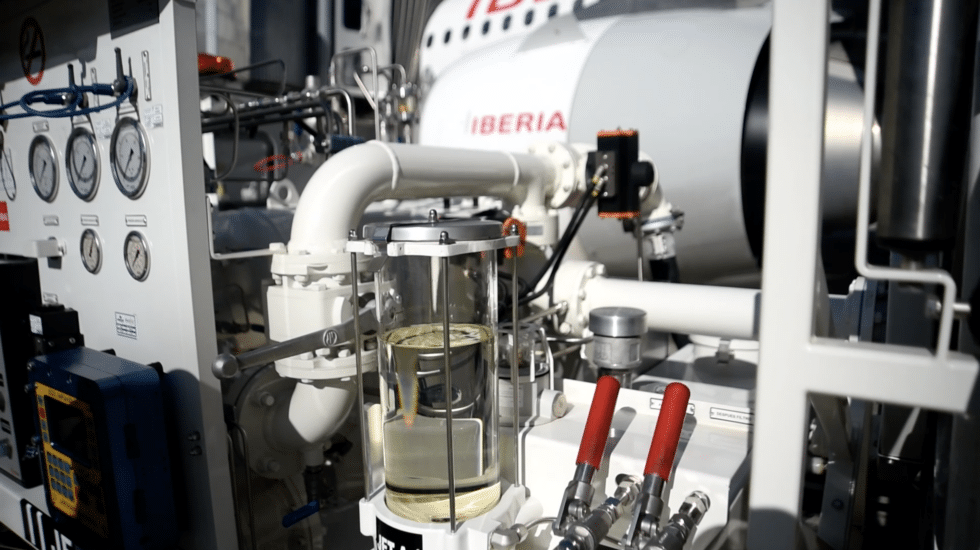

SAF fuel can now be used without making any changes to aircraft or airport infrastructure.
Sustainable Aviation Fuel (SAF)
abbreviation in English), is an alternative fuel to fossil fuels that It was
is positioned as the best tool for decarbonizing the aviation sector. It can be organic (derived from vegetable oils, animal fats, biomass or other waste materials such as agricultural waste) or synthetic (derived from CO2 capture through the use of green hydrogen). And this is an immediate response to the fight against climate change.
SBC reduces CO2 emissions by 60–100% short, medium and long range flights, taking into account the entire process from production to consumption. Its big advantage is that it can already be used – and in fact is already in use – since there is no need to modify any mechanism in aircraft or airport infrastructure. And it also represents a solution to the waste crisis because waste becomes a new business opportunity.
Aircraft are now certified to run on 50% sustainably sourced fuel. And there are already companies that are betting on them. This is the case of IAG, First airline group in the world to commit to carbon neutrality by 2050, and that emissions will be reduced by 20% in 2030. They are clear that the SAF will play a key role in achieving this goal. And that is why, from 2030, the group will operate 10% of its flights on this type of fuel.
Chance for Spain
The big problem with SAF is that its production is currently low compared to demand. With existing infrastructure It is possible to cover only less than 1% of the world demand for this fuel., so it is imperative to promote its large-scale production. And it requires a huge effort on the part of all parties involved, public and private, to mobilize to get production plants up and running.
This is a great opportunity to create wealth and employment. But also a challenge. At the moment, countries such as the USA, England or France are winning the race., and they are already working on plans to stimulate their production and opportunities to lead the future of this industry. But Spain could play a key role.
Because our country has everything it needs to become a benchmark in this sector. This explains Teresa Parejo, Director of Sustainability at Iberia: “Spain has the opportunity to become a great SHS producing power.. Firstly, there is a huge amount of forestry, agricultural and livestock waste, which is used for the production of biological SAF. Moreover, the country is on track to become a leader in the production of green hydrogen, which will be used to produce synthetic SAF.”
One of the best news is that rural Spain could be a big beneficiary., since this is where the waste necessary for the production of biological SAF is located. In this sense, the regions with the greatest production potential are, in order, Andalusia, Castile and Leon, Castile-La Mancha, Catalonia, Aragon and Extremadura.
“Spain has the opportunity to promote this type of new industry.
fuels and take advantage of the fact that we are leaders in renewable energy to
Decarbonize air transport immediately and with a future in mind. Moreover, this new industry will create a new business model with thousands of quality jobs with a vocation to develop in rural areas of Spain, which would lead to social and territorial cohesion. We could export SAF and at the same time have energy independence and security,” says Parejo.
From 2050 onwards, Spanish aviation will require five million tonnes of SAF per year. According to PwC research, if they are distributed throughout the country among Having 30-40 manufacturing enterprises, our country will be able to cover the entire national demand. And given that the production potential far exceeds local demand, with the installation of more plants it will be possible to export larger volumes to the international market. The impact on GDP of the construction and launch of these 32 production plants will be 56 billion euros until 2050. This means the creation of 270,000 new jobs.
IAG rate
Parejo makes it clear what Spain needs to gain strength in this sector: “It would be interesting for public authorities, both national and European.will help with incentives to accelerate the production of clean fuels. The United States has regulations that favor the production of SAF at competitive prices, meaning production is concentrated there.”
For now, Iberia and IAG have already entered into agreements with Repsol and Cepsa to advance the production of SAF.. And they even carried out the first demonstration flights in both the domestic market (Bilbao in October 2021) and intercontinental markets (Dallas, San Francisco and Washington).
in June 2022).
Over the next 20 years, IAG will invest almost $900 million in SAF. purchasing six million gallons a year from the American firm Gevo. The agreement stipulates that starting in 2028 and for five years, they will use this fuel to fuel aircraft at Los Angeles and San Francisco airports. This further highlights the production and supply challenges we have in Europe.
“Sustainable development cannot be achieved individually or in isolation. This is everyone’s job, but not just in the private sphere. Given the size and ambition of the project, public-private alliances are necessary.In particular, manufacturing companies with the government, as well as with local and regional administrations,” concludes Parejo.
Source: El Independiente